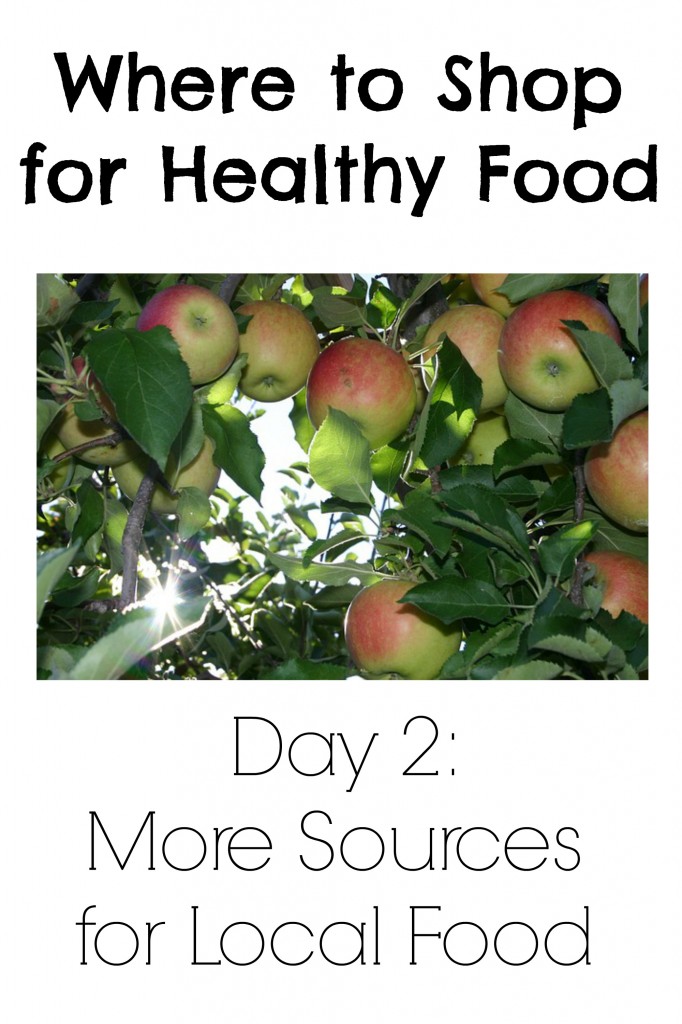Where to Shop for Healthy Food: More Local Food Options
Welcome back to the “Where to Shop for Healthy Food” series!
As I mentioned yesterday, the best way to make sure that what you are eating is uncontaminated with pesticides, GMO's, artificial hormones, and the like, is to know the person who grew/raised your food and how they did so.
Farmer's Markets are an excellent way to procure local food, but there are several other sources you can tap into as well.
CSA
CSA stands for Community Supported Agriculture. Basically, you pay the farmer (or multiple farmers if they have organized a joint program among themselves) at the beginning of the season to grow your food for you, and you get a portion of the harvest.
Just like when you shop at the Farmer's Market, you need to ask questions of the farmers who will be growing your food such as what, if anything, do they use for pesticides and fertilizers, what they feed their animals, etc.
The CSA I am a member of supplies an entire gamut of food, including meat, eggs, fruits, vegetables, and herbs. Some CSA programs only provide produce. Each one will vary as to what foods it provides and the specifics of how it operates.
You can find a CSA program in your area by going to www.localharvest.org/csa/ and typing in your zipcode. You can also ask around to the farmers at the Farmer's Market because there may be something you're not aware of, or they may consider starting one if there's not one available and they see that there is interest.
Directly from the farmer
As you get to know your farmers via the Farmer's Market, you will (or at least you should!) start to develop personal relationships with them. When the Farmer's Market is closed for the winter, you will still have access to whatever food they may still have growing.
Grow a garden or raise your own animals
You can't get anymore local than your own backyard! If you're finding that your budget is too limited to afford all the healthy food you'd like to buy, consider growing it yourself! You'll have to consider how much work you'd have to put into it versus the amount of money you would save and determine what your family's priorities are.
If you can't garden due to time restraints (or lack of desire! that's me raising my hand!), think about people you know that enjoy gardening. If you're able to do so without being inappropriate, let them know that you're interested in any extra produce they may have. Many ambitious gardeners grow a few too many tomato and squash plants during the summer and more than happy to have someone take part of the harvest off their hands!
Foraging
Foraging is the art of looking for food that grows on its own. If you live in the country, you can enjoy some family outdoor time while you wander down back roads searching for wild asparagus or berry patches. Once you know where they are, it will be easy picking come the next year.
As you're out and about, keep your eyes peeled for anything edible, even if it's on someone else's property. If you see apples, pears, or pecans lying on the ground and rotting, the owners of the trees may not care to pick them. Dust off your pride and go ask if they pick the apples on their trees. If not, ask if they mind if you come pick them. There's a very good chance they'll say yes since rotten apples aren't a lot of fun to run over with the lawn mower.
There are a lot more foods you can forage than just the ones I've mentioned here. Don't expect to be an expert overnight. You have to learn what to look for (and I'm still not very good at it.) But with a little practice, you'll be bringing in some free food!
What did I forget? Share all your tips for procuring local food in the comments!

